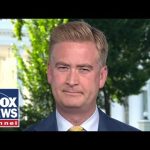Deputy White House Press Secretary Harrison Fields fired up conservatives this week by rallying behind President Trump’s aggressive trade strategy. Speaking on Newsmax’s National Report, Fields declared that Trump’s deals are only the beginning of a new era where America demands fairness. “They’re lining up to do business with us,” Fields stated, framing foreign nations as eager partners after years of global trade weakness.
The Trump team is using tariffs like a whip to crack international cooperation. Fields highlighted recent breakthroughs with Japan and Indonesia, proof that America’s willingness to enforce trade penalties forces concessions. Early August looms as a key deadline for tariff enforcement, pressuring nations to strike deals before sanctions bite.
At the heart of these negotiations is American energy independence. The administration is leveraging U.S. liquefied natural gas (LNG) exports as a bargaining chip. Fields emphasized that countries are agreeing to massive LNG purchases to avoid tariffs, turning “America First” into a global energy strategy. Over 20 new LNG contracts have been signed so far this year, reshaping oil markets and boosting American producers.
China remains the elephant in the room. Despite tensions over a 145% tariff, Fields confidently stated that President Trump “understands” Chinese President Xi Jinping – implying top-tier strategic leverage. The administration’s messaging insists China “needs us” more than the reverse, framing the relationship as Washington leading a dominant player.
These aren’t your typical outdated trade agreements. Fields praised Trump’s rapid dealmaking with nations like Malaysia and the EU, avoiding years of bureaucratic red tape. Conservatives see this approach as a rejection of Washington’s traditional slow-moving trade apparatus, favoring bold action over endless negotiations.
Critics claim these are patchwork solutions, but Fields called them wins for American workers. “A level playing field” became his mantra, arguing Trump’s tariffs punish unfair trade practices that eroded U.S. manufacturing. The focus resonates with voters tired of seeing factories closed and jobs lost to foreign economies.
Fields hinted more deals are coming soon. “This is not just good for us – it’s good for them,” he said, suggesting foreign partners share mutual benefit. The argument plays into conservative skepticism of open-border economics, positioning trade not as a loss but as useful pressure tactics.
Watchdog groups warn that these agreements lack the depth of traditional pacts, but Fields dismissed their concerns. “The world understands something has to change,” he declared, positioning the administration as disruptors of broken global systems. For conservatives, this marks exactly why they elected Trump – to challenge the status quo.




